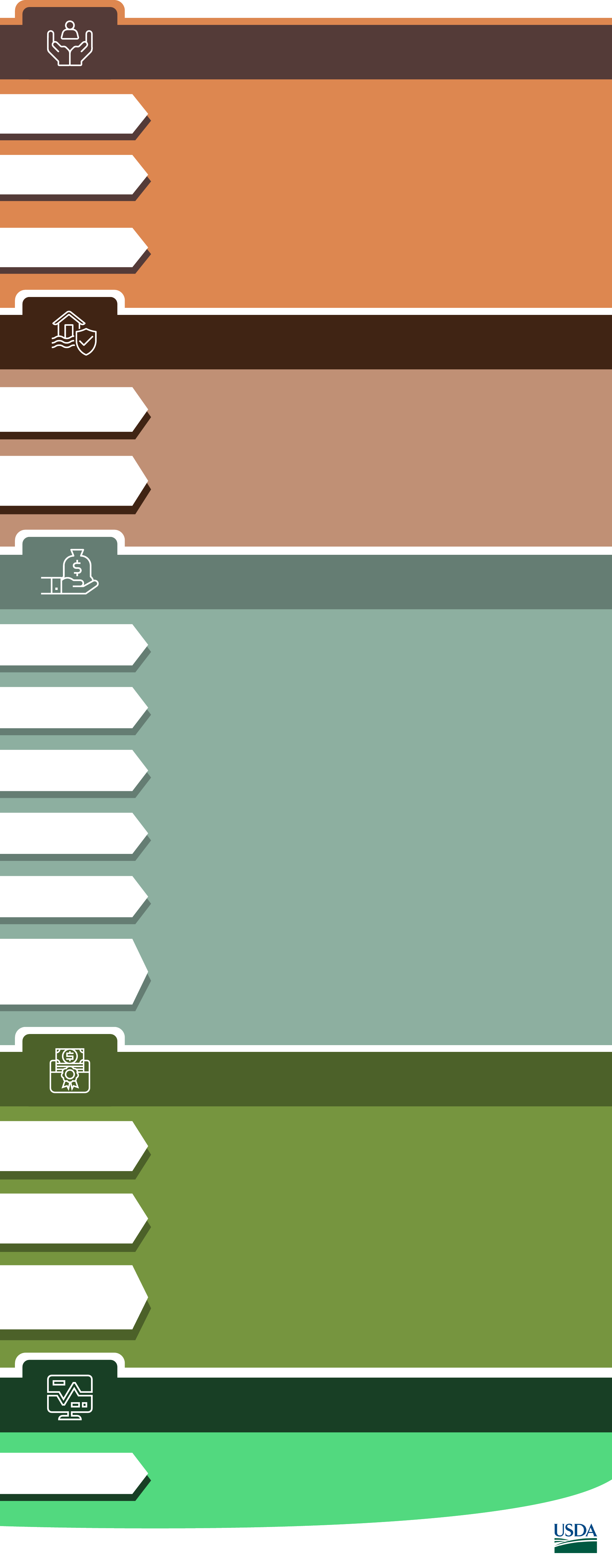
USDA PROGRAMS AND RESOURCES TO SUPPORT BEEKEEPERS
The following provides a summary of USDA insurance programs, disaster assistance programs, loan programs,
and other resources for beekeepers.
Insurance Programs
Market-based risk management tools to strengthen the economic stability of agricultural
producers and rural communities.
Apiculture
Rainfall Index
The Apiculture Pilot Insurance Program (RI-API) provides a safety net for beekeepers’ primary
income sources – honey, pollen collection, wax, and breeding stock. Beekeepers can purchase
RI-API through a crop insurance agent that works for an Approved Insurance Provider.
Whole-Farm
Revenue Protection
Whole-Farm Revenue Protection provides a risk management safety net for all commodities,
including honey, on the farm under one insurance policy. This insurance plan is tailored for
any farm with up to $8.5 million in insured revenue.
Micro Farm
Program
A new insurance option for small, diverse farms that sell locally. The policy oers revenue
guarantees for beekeepers producing honey, bees, queens, and other products of the hive
when facing unavoidable adverse events, such as drought and other weather-related events.
It also simplies recordkeeping and covers post-production costs and value-added products,
such as bottled honey, to make crop insurance more useful to smaller beekeepers and
agricultural producers.
Disaster Assistance Programs
Oers disaster assistance programs in instances where beekeepers have been hit hard
by natural disaster events.
Emergency Livestock
Assistance Program
The Emergency Assistance for Livestock, Honey Bees, and Farm-Raised Fish program provides
nancial assistance to eligible honey bee producers for eligible adverse weather events and
losses. Drought is not an eligible cause of loss for honey bee colony losses.
Noninsured Crop
Disaster Assistance
Program (NAP)
Eligible beekeepers can quality for NAP nancial assistance when losses incurred by natural
disasters are not covered by other disaster assistance programs.
Loan Programs
USDA oers a variety of direct and guaranteed loan programs for eligible beekeepers.
See guide for more information.
Farm Loan
Program (FLP)
Beekeepers whose primary business is honey production, qualify as a family farm, and
demonstrate security and eligibility can be considered for FLP guaranteed loans, which can
assist in building overwintering colony storage facilities.
Farm Storage
Facility Loan Program
This program provides low-interest nancing so producers can build or upgrade facilities to
store commodities, including honey.
Microloan
Programs
Operating and ownership loans to better serve the unique nancial operating needs of new,
niche, and small to mid-sized family operations.
Emergency
Loan Program
Emergency loans to help beekeepers recover from production and physical losses due
to drought, ooding, other natural disasters, or quarantine.
Beginning Farmers
and Ranchers Loans
Direct and guaranteed loan programs, ownership loans, operating loans, and microloan
programs for beginning farmers and ranchers, including beekeepers.
Nonresource
Marketing
Assistance Loans –
Honey Program
Marketing assistance loans provide interim nancing at harvest time to help beekeepers
meet cash ow needs without having to sell their commodities when market prices are
typically at harvest-time lows.
Grants
Local Agriculture
Market Program
(LAMP)
Multiple grants and programs are available through LAMP to support development,
coordination, and expansion of direct producer-to-consumer marketing; local and regional
food markets and enterprises; and value-added agricultural products.
Small Business
Innovation Research
(SBIR) Program
This program is open to small businesses that support the bee keeping industry in technology
development and transfer.
Sustainable
Agriculture, Research,
and Education (SARE)
Program
Producers and professionals in the beekeeping industry may apply for competitive funding
available through this program.
Diagnostic Testing
Bee Disease
Diagnosis Service
A free USDA beekeeper service to identify diseases, pests, and foulbrood resistance.
#USDAScience
USDA is an equal opportunity provider, employer, and lender.
